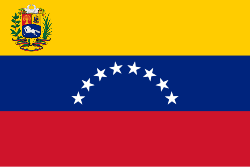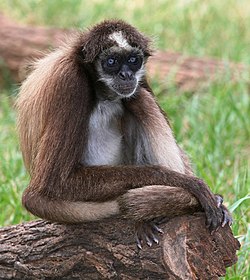Portal:Venezuela
The Venezuela Portal Venezuela, officially the Bolivarian Republic of Venezuela, is a country on the northern coast of South America, consisting of a continental landmass and many islands and islets in the Caribbean Sea. It comprises an area of 916,445 km2 (353,841 sq mi), and its population was estimated at 29 million in 2022. The capital and largest urban agglomeration is the city of Caracas. The continental territory is bordered on the north by the Caribbean Sea and the Atlantic Ocean, on the west by Colombia, Brazil on the south, Trinidad and Tobago to the north-east and on the east by Guyana. Venezuela is a presidential republic consisting of 23 states, the Capital District and federal dependencies covering Venezuela's offshore islands. Venezuela is among the most urbanized countries in Latin America; the vast majority of Venezuelans live in the cities of the north and in the capital. The territory of Venezuela was colonized by Spain in 1522 amid resistance from Indigenous peoples. In 1811, it became one of the first Spanish-American territories to declare independence from the Spanish and to form part of the first federal Republic of Colombia (Gran Colombia). It separated as a full sovereign country in 1830. During the 19th century, Venezuela suffered political turmoil and autocracy, remaining dominated by regional military dictators until the mid-20th century. From 1958, the country had a series of democratic governments, as an exception where most of the region was ruled by military dictatorships, and the period was characterized by economic prosperity. Venezuela has experienced democratic backsliding, shifting into an authoritarian state. It ranks low in international measurements of freedom of the press and civil liberties and has high levels of perceived corruption. Venezuela is a developing country, has the world's largest known oil reserves, and has been one of the world's leading exporters of oil. Previously, the country was an underdeveloped exporter of agricultural commodities such as coffee and cocoa, but oil quickly came to dominate exports and government revenues. The excesses and poor policies of the incumbent government led to the collapse of Venezuela's entire economy. The country struggles with record hyperinflation, shortages of basic goods, unemployment, poverty, disease, high child mortality, malnutrition, environmental issues, severe crime and corruption. US sanctions and the seizure of Venezuelan assets overseas have cost the country $24–30 billion. These factors have precipitated the Venezuelan refugee crisis in which more than 7.7 million people had fled the country by June 2024. By 2017, Venezuela was declared to be in default regarding debt payments by credit rating agencies. The crisis in Venezuela has contributed to a rapidly deteriorating human rights situation. (Full article...) Selected article -El Hatillo Municipality (Spanish: Municipio El Hatillo) is an administrative division of the State of Miranda, Venezuela; along with Baruta, Chacao, Libertador and Sucre, it is one of the five municipalities of Caracas, the capital of Venezuela. It is located in the southeastern area of Caracas, and in the northwestern part of the State of Miranda. The seat of the municipal government is El Hatillo Town, founded in 1784 by Don Baltasar de León, who was instrumental in the area's development. Although the town had its origins during the Spanish colonisation, the municipality was not established until 1991. In 2000 – the year after a new constitution was enacted in Venezuela – some of the municipality functions were delegated to a consolidated mayor's office called Alcaldía Mayor, which also has some authority over the other four municipalities of Caracas. (Full article...) Selected picture
Plaza Francia, also known as "Plaza Altamira", is a public space located in Altamira, east Caracas. It was built at the beginning of the 1940s and opened on August 11, 1945 with the name "Plaza Altamira". Its name was later changed due to an agreement between the cities of Caracas and Paris to have a Venezuela Square in Paris and a France Square in Caracas.
Selected biography -Pablo Emilio Sandoval Reyes (born August 11, 1986) is a Venezuelan-American professional baseball third baseman for the Staten Island FerryHawks of the Atlantic League of Professional Baseball. He has previously played in Major League Baseball (MLB) for the San Francisco Giants, Boston Red Sox, and Atlanta Braves. He stands 5 feet 10 inches (1.78 m) tall, and weighs 268 pounds (122 kg). Nicknamed "Kung Fu Panda", Sandoval is a two-time All-Star and has won three World Series championships with the Giants. He hit three home runs in Game 1 of the 2012 World Series, becoming the fourth player to hit three home runs in a World Series game, leading to his being named that year's World Series Most Valuable Player (MVP). During the offseason, Sandoval plays for the Navegantes del Magallanes of the Venezuelan Professional Baseball League (VPBL). In 2002, Sandoval was signed by the San Francisco Giants. Sandoval worked his way through the minor leagues and debuted with the Giants in 2008, batting .345 in 41 games. Capable of playing first base, third base, and catcher, he became the Giants' starting third baseman in 2009, ceasing to catch that year and playing first base only occasionally. In 2009, Sandoval finished second in All-Star Final Vote balloting, batting .330 with 25 home runs and 90 runs batted in (RBIs) in his first full season in the majors. However, Sandoval struggled in 2010 and was benched during the playoffs for the 2010 World Series, which the Giants won. He lost weight before 2011 and hit .315 with 23 home runs in 117 games. Injuries limited Sandoval to 109 games in 2012, but he was selected to his second-straight All-Star Game. Then, in Game 1 of the 2012 World Series, Sandoval joined Babe Ruth, Reggie Jackson, and Albert Pujols as the only players to hit three home runs in a World Series Game. For his contributions, Sandoval was named the World Series Most Valuable Player, as the Giants swept the Detroit Tigers. In 2013, he appeared in 141 games, batting .278, with 14 home runs, and 79 RBIs. (Full article...) In this month...
Did you know (auto-generated) -
Selected list -The Luis Aparicio Award is given annually to a Venezuelan player in Major League Baseball (MLB) who is judged to have recorded the best individual performance in that year. The winner of the award is determined by a vote conducted by Venezuelan sports journalists and Spanish-language media around the world. It is named after former MLB shortstop Luis Aparicio, who is the only player from Venezuela to be inducted into the National Baseball Hall of Fame. The award was first presented in 2004, and was created in order to honour Aparicio's major league career and to commemorate his father, who died thirteen years before his son was elected into the Hall of Fame. Johan Santana, Jose Altuve, Miguel Cabrera, and Ronald Acuña Jr. are the only players to win the Luis Aparicio Award more than once, with Cabrera having won the award five times. Cabrera won the MLB Most Valuable Player (MVP) Award and Hank Aaron Award alongside the Luis Aparicio Award in 2012 and 2013, becoming the first Venezuelan to win the MLB MVP Award. Santana, the 2004 and 2006 recipient, also won the Cy Young Award in those two years, winning by a unanimous vote on each occasion. Altuve is the only player to win the Luis Aparicio Award, the MVP award, and become a World Series champion in the same season in 2017. He has also won a batting title in three of his four award seasons. Santana (2006) and Cabrera (2012) are the only award winners to also earn the pitching and batting Triple Crown respectively in the same season. In accomplishing the feat, Cabrera became the first player in 45 years to achieve a Triple Crown in batting since Carl Yastrzemski in 1967, while Santana became the first pitcher since Dwight Gooden in 1985 to secure a "Major League Triple Crown" by leading all of MLB in wins, earned run average and strikeouts. Francisco Rodríguez compiled a major league record of 62 saves in a single season in 2008 and went on to win the Rolaids Relief Man Award in the same year as the Luis Aparicio Award. Five winners – Cabrera, Altuve, Magglio Ordóñez, Carlos González, and Arráez – were batting champions in their respective leagues in the same year they won the award. (Full article...) Current eventsNo recent news More did you know...
TopicsCategoriesRecognized content
Featured articlesGood articles
Featured pictures
New articlesThis list was generated from these rules. Questions and feedback are always welcome! The search is being run daily with the most recent ~14 days of results. Note: Some articles may not be relevant to this project.
Rules | Match log | Results page (for watching) | Last updated: 2025-04-21 22:53 (UTC) Note: The list display can now be customized by each user. See List display personalization for details.
Things you can doWikiProjects
Related portalsAssociated WikimediaThe following Wikimedia Foundation sister projects provide more on this subject:
Discover Wikipedia using portals
|








































